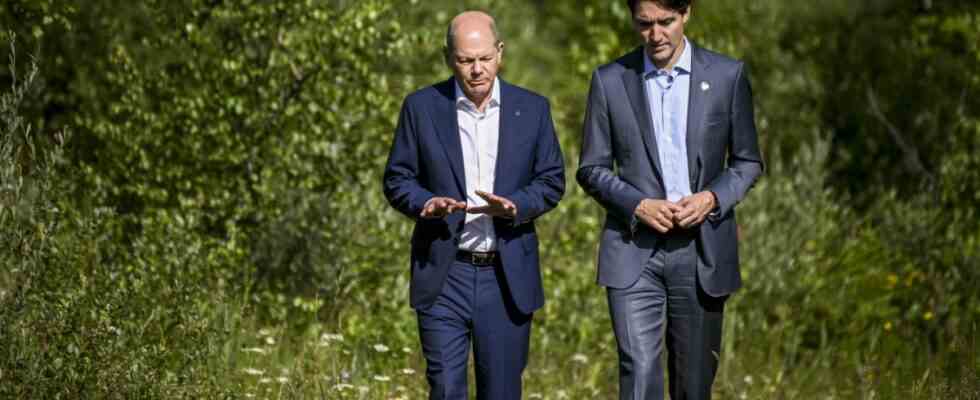It was a question the Chancellor had evidently been waiting for. During his visit to Siemens Energy in Mülheim an der Ruhr three weeks ago, Olaf Scholz was asked whether his unusual appearance in front of a gas turbine was also a “sign in the direction of Canada”. The Chancellor eagerly agreed: He was “extremely grateful to the Canadian government and Prime Minister Justin Trudeau for their great willingness to help Europe and to enable the export of this serviced turbine”.
Trudeau had allowed the delivery of the turbine serviced for the Nord Stream 1 gas pipeline in Canada against Canadian sanctions rules at Scholz’s request. Then the turbine got stuck in Germany, Russia didn’t want it at all. Scholz praised Trudeau for helping to expose the Russian “bluff”. He would like to express his gratitude to the local public again shortly.
Scholz now has the opportunity to do so. After the open day at the Chancellery, he set out on Sunday for a trip to Canada that was special in many respects. Scholz, who usually keeps his visits abroad short, is not expected back in Germany until Wednesday. Moreover, the Social Democrat is not only accompanied by a business delegation, but – extremely unusually – by the Vice Chancellor, Economics Minister Robert Habeck from the Greens. The composition of the travel party describes the destination.
Part of the solution to Germany’s energy needs could lie in Canada
While Russia has just announced a complete stop of gas supplies through the Nord Stream 1 gas pipeline for several days, Scholz and Habeck want to look around where they suspect at least part of the solution to Germany’s energy policy needs. The federal government is particularly interested in green hydrogen from Canada in the long term. A “hydrogen agreement” is ready to be signed, with which production and the development of delivery routes to Europe are to be promoted.
“The country has similar rich natural resources as Russia – with the difference that it is a reliable democracy,” said Scholz on Sunday evening after arriving in Montreal. Therefore, new fields of cooperation opened up. He cited the development of a hydrogen economy as examples. Scholz said that Canada is a very special partner for Germany. “There is hardly any other country outside the EU where we have such close and friendly ties as we do with Canada.” You share common values and a similar view of the world.
However, Scholz and Habeck are not only interested in hydrogen, but also in liquefied natural gas (LNG) to replace missing deliveries from Russia. According to the Chancellor’s Office, there is “great interest in working closely with Canada in the LNG sector.” However, it is about projects that “are not yet mature on the Canadian side”. There will therefore be no agreements or declarations of intent. Among other things, this has to do with domestic political resistance to fracking, which is also controversial in Canada.
It so happens that the chancellor and vice chancellor begin their journey in Québec, where the LNG plans are being slowed down by what the chancellor’s office says is a “quite critical provincial government”. A meeting with the provincial premier, François Legault, is planned there. However, the federal government does not expect any short-term help from Canada. It is clear that nothing can be delivered in the next year or two because there are still no LNG export terminals on the east coast of Canada.

